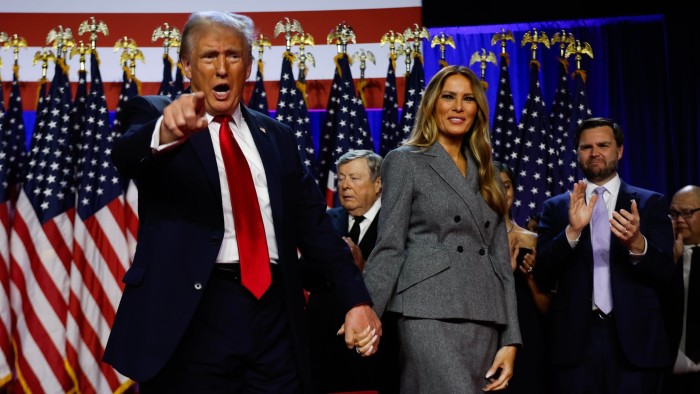Take no comfort from America’s Trump backlash

Unlock the White House Watch newsletter for free
Your guide to what Trump’s second term means for Washington, business and the world
At 39 per cent, Donald Trump has the lowest approval rating after 100 days in office of any US president since the second world war. There are two types of people in the world. There are those who will regard that terrible number as the story, and those who won’t be able to believe that it is so high. The second group have a better handle on things.
Too much is being made of the public backlash — such as it is — against Trump. Just 6 per cent of those who backed him last November regret doing so. (And these remorseful few must be weighed against the 3 per cent of Kamala Harris voters who say the same about their choice.) This is after the tariffs, the ambush of Ukraine’s President Volodymyr Zelenskyy in the Oval Office, the promotion of Tesla cars on the White House driveway. For reference, Trump had ratings almost as low eight years ago, and went on to run Joe Biden close for re-election, before winning in 2024.
Even if the turn in sentiment against Trump were as decisive as billed, the message would be — what? Trample the constitution, but don’t dare get the economics wrong? And in this there is liberal solace to be found, is there? For his first impeachment, Trump withheld aid to Ukraine, which had been under attack since 2014, to secure its help in digging dirt on Biden. For his second, he tried to overturn the result of a presidential election, in the course of which effort people died. Voters decided last November that such acts aren’t disqualifying. If stock market reversals push them over the edge now, that is fair enough, but let us contain the moral jubilation.
The real lesson of the polls is one we shouldn’t need. A very large minority of voters, more than a third, are more or less unreachable. This isn’t an electoral problem for the Democrats, who can win without them, but it is a constitutional one for the US. It is hard to know how a republic is to survive such a large caucus who are loyal to their partisan team — to one man, in fact — over any rule, principle or institution of state.
Why are people so entrenched? Why is Trump’s core support almost as firm as literal bedrock? If you think big problems must have big causes, there is one that stands out. For some voters, political tribe offers the sense of belonging that religious affiliation once did, before church membership declined in the US. The fellow feeling, the structure, is so dear to them as to override all ethical qualms, just as a worshipper won’t have a word said against an obvious low-life of a pastor. The left isn’t so different.
Or the answer might be fiddlier than that. One effect of social media gets too little attention. In the past, a citizen who took a political view they later came to regret could dump it without much embarrassment, like Homer Simpson backing into that hedge. This is because almost no one (including perhaps themself) would remember their initial stance. Now, there is likely to be a digital trail, in the form of a tweet, Facebook post or WhatsApp message.
We have, as the kids say, the “receipts”. And so the social cost of changing one’s mind, the friction, is more than it was. We are all columnists now, even if the readership are just friends, family and colleagues.
In 2003, a majority, not just a plurality, of Brits supported the Iraq war, according to YouGov. Over a decade later, the country “remembered” taking a different view. Nowadays, you’d sooner find someone who confessed to siding with the hunter against Bambi’s mother than backing the invasion. It is hard to know whether to feel horrified by this patent self-deception, or nostalgic for a time when people could slide in and out of viewpoints without leaving an incriminating residue.
Either way, whether the cause is tech or a hunger for group membership in an atomised world, the effect is the same. A large share of those who turned to Maga around a decade ago will be there until the end. The backlash against Trump in recent weeks is big enough to encourage the Democrats ahead of the midterm elections in 2026. It is not so big as to warrant some of the wider optimism about the republic. Even if a tariff-induced recession completely scuttles Trump’s rating, that isn’t the same as a people’s uprising in defence of the constitution. And don’t be surprised if lots of voters who hated the economic pain under Biden shrug off much worse under Trump out of sheer partisan intransigence.
America might have more than most, but there are unreachable voters in all democracies. Since Nigel Farage’s Reform UK won the local elections last week, well-meaning grandees in Britain have written 10-point plans to win over his supporters, which include improving economic growth, because no one has ever thought of that before. And look, there are half-committed Farage fans who can indeed be lured back with slightly better government and other practical offerings. But at some point liberals will have to accept that western democracies now harbour a huge minority of voters who are indefinitely lost to them.
A start might be to put the popular revolt against Trump in some perspective. In one poll, by Emerson College, a group who had chosen him over Harris by 1.2 percentage points in November would now only do so again by 0.8 percentage points. There is being grateful for small mercies, and there is this.








